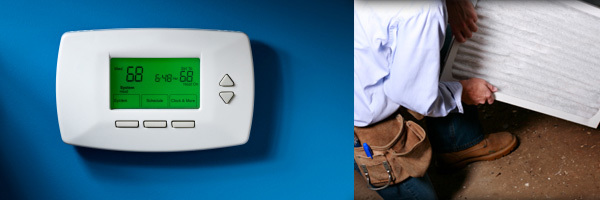Tips for Your Home

Nine Tips to Control Your Heating Costs
As the cost of heating homes goes higher and higher, many families are scrambling to pay their heating bills. So what can we do? Following are some helpful tips for saving both money and energy.
- Lower the set point of your thermostat by 2 degrees, you can save about 6% of your energy costs over a 24 hour period.
- Install a programmable thermostat. These are relatively inexpensive but will allow you to fine-tune the operation of your heating system so that you don’t waste energy by running the system when heat is not required. For example, a programmable thermostat can lower your furnace’s temperature setting while you sleep, and then bring it up to your desired temperature before you awake, and then turn it back down after you leave for work, and turn it back up to your desired temperature level shortly before you arrive home.
- Replace dirty filters with new furnace filters so that air flows through the system without restriction. This will maximize your furnace’s delivery of warmed air. Filters should be replaced every 30 to 45 days during peak seasons, when the equipment is running more frequently.
- Arrange furniture and drapes so they don’t restrict airflow.
- Don’t waste energy through excess ventilation. Do not over-use exhaust fans in bathrooms, utility rooms, and kitchens. When you need to expel the air from these rooms, do so. But then turn the fans off so they don’t exhaust expensively heated room air.
- Let the sun shine in! Open drapes or window shades that allow direct sunlight to stream in through windows on the south and west facing sides of the house. Where the sun does not shine in, leave drapes closed to minimize heat loss through the windows.
- Prune sun-blocking trees and large brushes. The trick here is not to cut down trees and brushes that will supply much-needed shade in the summer, but to open them up so the sun can shine on the house in the winter. Deciduous trees and brushes are ideal because they allow the sun during winter when they are bare of leaves but provide shade in the summer. Trees, fences, and other barriers that block the wind are helpful at reducing heat loss during the winter.
- Reduce heat loss through windows and doors. Be sure all windows, doors, and skylights are tightly sealed. Small leaks create drafts and allow expensively heated air to escape. The same is true with the fireplace damper- make sure it’s closed.
- Last, but not least, always have your furnace serviced annually to keep it running efficiently and to keep your family safe and warm throughout the winter months. If you have not done so give us a call today, it’s never too late.
Indoor Air Quality
Recent studies have shown that indoor air is often more polluted than outdoor air, and may pose more potential health risks. Much of the risk can be attributed to mold, bacteria, carbon monoxide, a buildup of allergens and even radon What do they have in common? They can all be improved through proper use of an appropriate indoor air quality system. Here are the four most important things you need to do to help maintain indoor air quality in your home.
- Filter Installation
With time, filters clog and can severely reduce the efficiency of your system. During a service call or as part of our Preventive Maintenance Agreement Plan, our service technicians will replace all filters on your air conditioning system. Donovan Brothers has a wide variety of filters available from Aprilaire’s 5000 electronic air cleaner to a standard 1” disposable filter, these will make sure your system receives consistent filtration service. - Humidifier Installation
A humidifier adds and regulates the amount of moisture that is added to your heating system. In colder months household air can become dry, causing uncomfortable irritation in the nose and throat as well as promoting allergic reactions. Donovan Brothers will evaluate the needs of your home and heating system to provide you with the proper humidifier for your needs and service, replace and repair existing humidifiers as needed. - Zone System Installation
Most homes have rooms that seem to be harder to cool and heat than others. For example, an attic loft bedroom may be much warmer than the lower levels of the home in the summer months, yet need extra help with heating during winter. Basement levels often stay much cooler year round, while rooms farthest away from the HVAC system may be inconsistent at different times of the year. Zoning such areas offers a reliable solution and helps keep all levels of the house consistent. By automatically adjusting where air flows inside your duct system, Donovan Brothers can zone your system to meet unique heating and cooling needs of your entire home. - Carbon Monoxide Detector Installation
Carbon monoxide (CO) is a colorless, tasteless, and odorless gas that can cause potentially fatal health risks throughout the home. Any piece of equipment that uses a flame to heat has the potential to produce carbon monoxide gas when it is not operating properly. Donovan Brothers will evaluate your home and install premium Carbon Monoxide Detectors where required. Our certified technicians will also; perform thorough checks using state of the art equipment of all possible carbon monoxide sources in the home, service all heating appliances annually to prevent potential problems and quickly inspect and correct all potential carbon monoxide problems after an alarm has activated
